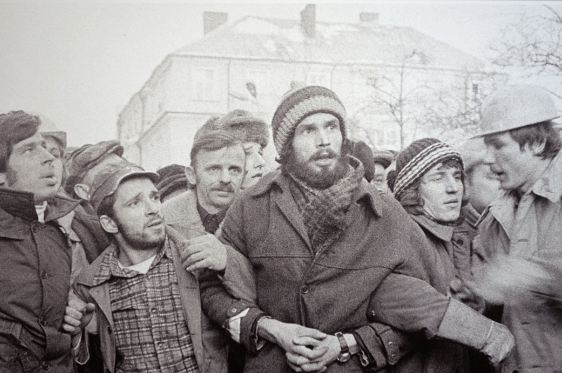Representatives of Poland’s communist government gave in to the demands of striking shipyard workers in Gdansk on August 31, 1980. Lech Walesa, a former electrician, led the striking workers, who later formed Solidarity, the first autonomous labor organization to emerge from a Soviet bloc country. In September 1980, Solidarity was founded and was forcibly suppressed by the Polish government in December 1981. In 1989, it resurfaced to become the first opposition movement in a Soviet-bloc country since the 1940s to participate in free elections. After forming a coalition government with Poland’s United Workers’ Party, Solidarity’s leaders controlled the national government.
After several thousand striking workers were attacked and incarcerated by authorities in numerous locations, a group of dissident intellectuals formed the Workers’ Defense Committee or Komitet Obrony Robotników. The KOR helped imprisoned workers’ families, provided legal and medical assistance, and disseminated information via an underground network. A Charter of Workers’ Rights was published in 1979.
Faced with an economic crisis in July 1980, Poland’s government increased the price of food and other items while limiting wage growth. Many Poles could not buy basic needs due to the price increases, and a wave of strikes swept the country. A popular forklift operator called Anna Walentynowicz was sacked from the Lenin Shipyard in the northern Polish city of Gdansk amid rising tensions. Gdask became a hub of resistance to government orders during a growing wave of new strikes in 1980 against rising food prices. Under the leadership of Lech Wasa, an electrician by trade, 17,000 workers at the Lenin Shipyards staged a strike and locked themselves inside the plant. An Interfactory Strike Committee was formed in Gdask in mid-August 1980 to coordinate fast-spreading strikes there and elsewhere; within a week, it had given the Polish government a list of demands based primarily on the KOR Charter of Workers’ Rights.
The government and the Gdask strikers negotiated an agreement on August 31 that sanctioned free and independent unions to strike and greater religious and political freedom.
Despite government censorship and efforts to block knowledge of the strike from spreading, similar protests erupted across Poland’s industrial cities. An Interfactory Strike Committee showed the Polish government with 21 ambitious requests on August 17, including establishing autonomous trade unions, the right to strike, the release of political prisoners, and expanded freedom of expression. Fearing a national uprising resulting from the general strike, the government dispatched a team to Gdansk to negotiate with the strikers. Walesa and Deputy Premier Mieczyslaw Jagielski reached an agreement on August 31 that met far too many of the employees’ demands. Walesa signed the declaration using a massive ballpoint pen with an image of freshly elected Pope John Paul II or Karol Wojtyla, the former archbishop of Krakow.
In the wake of the Gdansk strike, the Interfactory Strike Committee leaders voted to create a single national trade union known as Solidarnosc or Solidarity quickly grew into a significant social movement with a membership of over ten million people. Solidarity drew support from Western politicians but drew retaliation from Moscow, which feared a military invasion of Poland. Under Soviet pressure in late 1981, General Wojciech Jaruzelski annulled the recognition of Solidarity and declared martial law in Poland on December 13, 1981. As the moderate Wasa came under pressure from more militant unionists, Solidarity’s positions toughened. Meanwhile, the Soviet Union exerted heavy pressure on Jaruzelski’s government to repress Solidarity. The Sejm or Parliament formally dissolved the union on October 8, 1982, but it nevertheless continued as an underground organization.
Approximately 6,000 members of the Solidarity movement were detained, including Walesa, who was held for nearly a year. The Solidarity movement went underground, where it received support from foreign leaders, including US President Ronald Reagan, who placed sanctions on Poland.
In 1988, a new batch of strikes and labor unrest swept Poland, with official recognition of Solidarity topping the demands. The government agreed in April 1989 to legalize Solidarity and allow it to run in free elections for a bicameral Polish parliament. Solidarity-backed candidates won 99 of the 100 seats in the newly established Senate, or upper house, and all 161 seats that opposed candidates eligible to compete in the Sejm, or lower house, in June of that year.
In August, Solidarity and the PUWP agreed to establish a coalition government, and Tadeusz Mazowiecki, a longstanding Solidarity adviser, became Poland’s first noncommunist prime minister since the late 1940s 24. After a rift with Mazowiecki over the pace of Poland’s conversion to a market economy, Wasa was elected president of Poland in December 1990. Following the PUWP’s demise, the schism between Wasa and Mazowiecki precluded forming a Solidarity-backed coalition from leading the country. As many new political parties arose in Poland in the early 1990s, the union’s direct influence in the recent parliamentary scene waned.
Was Lech Walesa received the Nobel Peace Prize in 1983, and after the fall of communism in 1989, he became Poland’s first democratically elected president.
